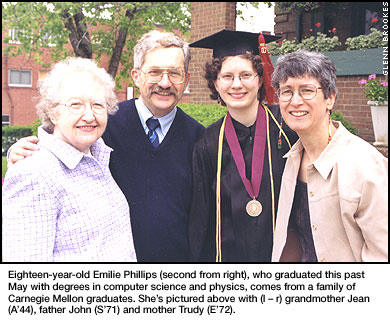|
|
||
|
|
|
 Phillips Family Spans a Century at Carnegie Mellon � On the surface, Emilie Phillips looks no different than other Carnegie Mellon students, but two things distinguish her from her fellow graduates: She's the fourth generation of her family to graduate from Carnegie Mellon and she's only 18 years old. Emilie's mother (E'72), father (S'71), grandmother (A'44), great-aunt (MM'33) and great-grandfather (E'09) are all alumni. Emilie continued the tradition by entering the university at age 14. She graduated last month with degrees in computer science and physics. The Phillips' history at Carnegie Mellon reflects how the school adapted over time to accommodate the educational needs of a society transitioning from an industrial economy to an information-based economy. Emilie's great-grandfather, Edgar Laird Phillips, worked in a Pittsburgh mill during the day, making molds for casting steel. At night, he attended Carnegie Technical Schools to advance his career, fulfilling the vision that Andrew Carnegie initially had when establishing the school. He graduated in 1909, as part of the school's second graduating class. His daughter, Ruth Phillips Rhen, graduated in 1933 from Margaret Morrison College with a degree in library science. She became librarian at the Squirrel Hill Carnegie Library at a time when no other woman held that position. Jean Prass Phillips, who married one of Edgar's sons, graduated from the College of Fine Arts in 1944 as a voice major and pursued a career as a music teacher. Her son, John Phillips, is Emilie's father. John, a 1971 physics graduate, and Trudy, one of only four women to graduate from the chemical engineering department in 1972, met at Carnegie Mellon and married while in school. After graduation, they moved to Laramie, Wyo., where John earned his doctorate in physics and Trudy her master's degree in chemical engineering at the University of Wyoming. John and Trudy accepted positions with Babcock/Wilcox (now Framatome ANP), the world's leading nuclear energy supplier, after completing their formal educations. While John describes himself as a wandering "trailer bunny" who camps in trailers to conduct evaluations of nuclear plants, Trudy is making her impact on the world through a range of civic activities, including her leadership role as grants manager for the Appalachian Club and her efforts to establish alternative schools that provide non-traditional learning environments for students. At 14 years of age, Emilie was one of the youngest students ever to enroll at Carnegie Mellon, but her poise and maturity belie the reality that she's now only 18—the age when most students begin college. Trudy remembers that as a young child, Emilie initially didn't want to read. She just wanted to study math and thought that words weren't necessary. "I took down a couple of old calculus books and showed her that there were words. In a few days, she taught herself to read," Trudy said. Emilie's parents recognized her gifts early and advocated accelerating her education. She skipped 2nd, 7th, 11th and 12th grades and took courses at a local community college before entering Carnegie Mellon without a high school degree. Emilie felt isolated in middle school, but the opposite was true at Carnegie Mellon, where her focus on academics was accepted and nurtured by faculty and friends. Emilie decided to study computer science after being captivated by some robots she spotted in a hallway while visiting the campus. Once she arrived at the university, Emilie continued to blaze new trails like her female forbearers. Her fascination with physics grew quickly as she took upper-level courses without the recommended prerequisites. For her, they offered the best challenge. She also worked on research projects, including a recent senior project with Physics Professor Sara Majetich, funded by the Small Undergraduate Research Grant (SURG) program. Her SURG grant was supported by Victor Bearg, a 1964 physics graduate. She plans to continue her research in physics when she heads to Cornell University this fall to pursue her doctorate. Like her parents, Emilie's interests extend beyond science to the outdoors, and she was an avid member of Carnegie Mellon's Explorer's Club. Together, the Phillips family has undertaken an ambitious project to map wilderness trails at Dolly Sods, a popular but remote hiking area in West Virginia. Using their feet, technical know-how, and global positioning data software, the Phillips have made significant headway in reconstructing inaccurate, poorly designed trail maps. (See http://home.adelphia.net/~johntrudy/) John and Trudy are proud of their daughter's achievements at Carnegie Mellon and excited about her future as a graduate student in physics at Cornell. Through his own experience as a graduate student, her father knows that the best thing Emilie can do is question everything. Judging from her success at Carnegie Mellon, Emilie will find many answers along the way. � � �
�
Top�
�
�
Lauren Ward
|
|
This Issue's Headlines || Carnegie Mellon News Home || Carnegie Mellon Home |
||